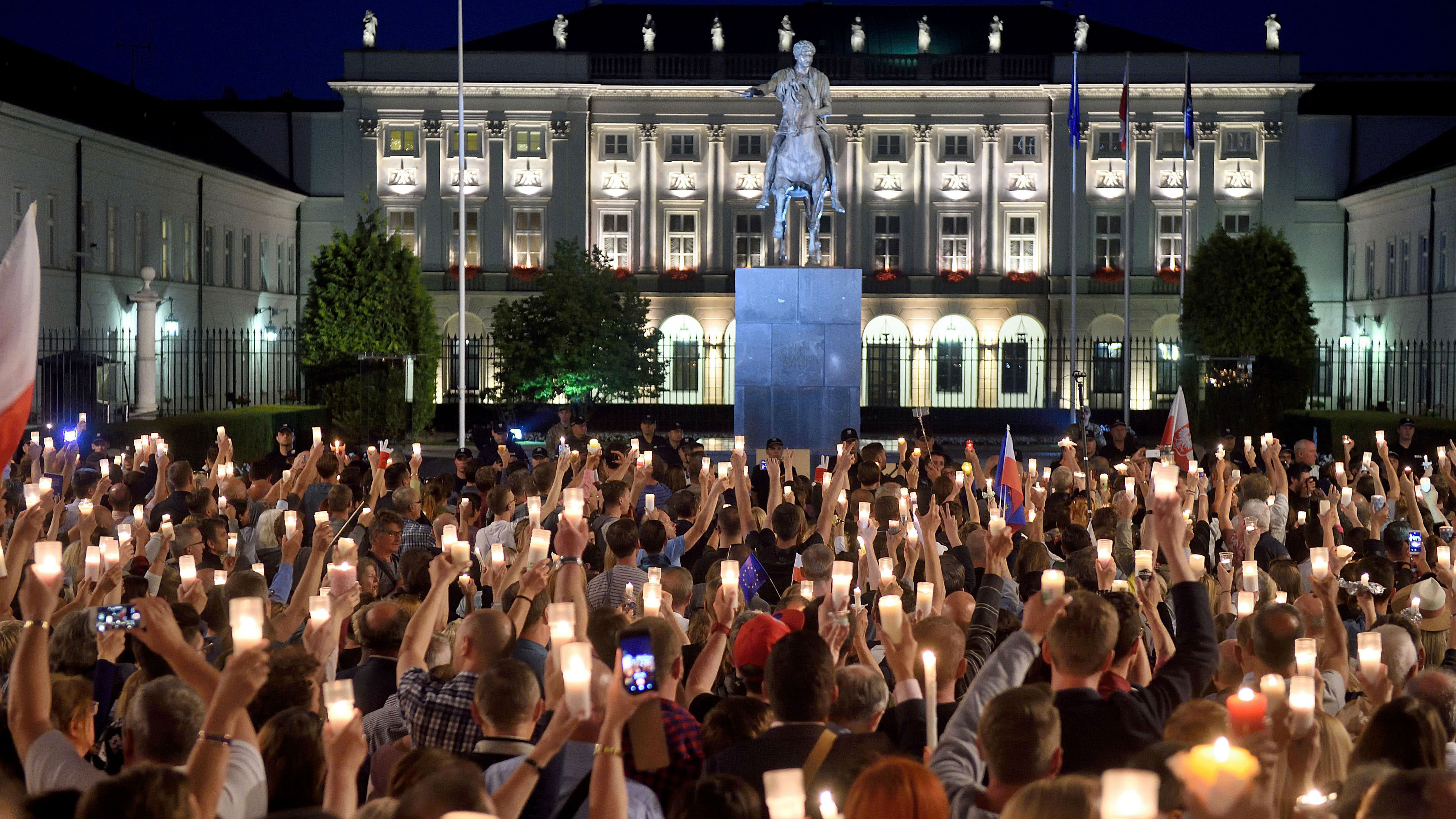Poland-EU showdown: what is the Article 7 ‘nuclear option’?
In Depth: Theresa May is heading to Warsaw amid EU-wide dispute over Polish judicial reforms

A free daily email with the biggest news stories of the day – and the best features from TheWeek.com
You are now subscribed
Your newsletter sign-up was successful
European Commission officials have threatened to invoke Article 7 of the Lisbon Treaty today in a long-standing row over Poland’s authoritarian judicial reforms.
The row could prove tricky for Theresa May, who is heading to Warsaw this week for a summit at which she hopes to push her vision of a post-Brexit trading relationship with the rest of Europe. The Prime Minister is likely to be asked about the two-year row over Polish judicial independence and Warsaw’s opposition to the EU’s refugee resettlement plans.
“The threat to make Poland a pariah in the EU family comes at a highly embarrassing moment for Mrs May, who is due to visit Warsaw on Thursday as part of a massive diplomatic charm offensive that has been launched by Britain towards Poland since Brexit,” says The Daily Telegraph.
The Week
Escape your echo chamber. Get the facts behind the news, plus analysis from multiple perspectives.

Sign up for The Week's Free Newsletters
From our morning news briefing to a weekly Good News Newsletter, get the best of The Week delivered directly to your inbox.
From our morning news briefing to a weekly Good News Newsletter, get the best of The Week delivered directly to your inbox.
So what is Article 7 and how could it affect Poland?
What is Article 7?
Article 7 was established to ensure that the bloc respects the “common values of the EU”, Politico says. The never-before-invoked clause permits the EU to punish member states who fail to uphold the bloc’s basic ideals: the respect for human dignity, freedom, democracy, equality, the rule of law, and respect for human rights.
How is Article 7 invoked?
A free daily email with the biggest news stories of the day – and the best features from TheWeek.com
Article 7’s preventive mechanism allows for members to warn Poland before a “serious breach” has materialised. Poland then has several weeks to respond, The Guardian says.
Commission President Jean-Claude Juncker is to lead the discussion today over whether to recommend activation of the EU disciplinary process, says the BBC News website. “It could see Polish Prime Minister Mateusz Morawiecki hauled before his fellow leaders, who could insist on changes.”
Sanctions could include Poland losing billions of euros of EU aid, Reuters reports.
Article 7’s sanctioning mechanism also allows for a so-called “nuclear option” - a suspension of Poland’s voting rights in the council of ministers in the case of a “serious and persistent breach” of EU values.
But the decision to take away voting rights would have to be unanimous among the bloc, and Hungary has already promised to veto any attempt to establish such a breach, Politico says.
Is there a chance that Poland will leave the EU?
It's unlikely.
“What’s occurring in Poland is parallel to what is occurring in Britain with Brexit,” says the US think tank Council on Foreign Relations. “At the core of it, the Polish ruling party is alleging that it is exercising sovereignty and taking [back] control. There is talk of a Polexit. It is clear that national sovereignty is vital to Poland, and it is often referred to by Polish authorities in response to the EU Commission’s criticisms of its reforms of the judiciary.”
But University of Warsaw Professor Piotr Wawrzyk told the Daily Express in August that he doesn’t believe the bloc will follow through on sanctions.
“Those are just scare tactics. The commissioner himself cannot instigate any sanctions,” said Wawrzyk. “This is not cooperation, only them saying, ‘We are bigger and smarter, better listen to us and do as we say’.”
Wawrzyk claimed that Poland would only quit the union if the EU continued to push its politics and forced Poland to adopt the euro.
-
 How to Get to Heaven from Belfast: a ‘highly entertaining ride’
How to Get to Heaven from Belfast: a ‘highly entertaining ride’The Week Recommends Mystery-comedy from the creator of Derry Girls should be ‘your new binge-watch’
-
 The 8 best TV shows of the 1960s
The 8 best TV shows of the 1960sThe standout shows of this decade take viewers from outer space to the Wild West
-
 Microdramas are booming
Microdramas are boomingUnder the radar Scroll to watch a whole movie
-
 Epstein files topple law CEO, roil UK government
Epstein files topple law CEO, roil UK governmentSpeed Read Peter Mandelson, Britain’s former ambassador to the US, is caught up in the scandal
-
 Iran and US prepare to meet after skirmishes
Iran and US prepare to meet after skirmishesSpeed Read The incident comes amid heightened tensions in the Middle East
-
 Israel retrieves final hostage’s body from Gaza
Israel retrieves final hostage’s body from GazaSpeed Read The 24-year-old police officer was killed during the initial Hamas attack
-
 China’s Xi targets top general in growing purge
China’s Xi targets top general in growing purgeSpeed Read Zhang Youxia is being investigated over ‘grave violations’ of the law
-
 Panama and Canada are negotiating over a crucial copper mine
Panama and Canada are negotiating over a crucial copper mineIn the Spotlight Panama is set to make a final decision on the mine this summer
-
 Why Greenland’s natural resources are nearly impossible to mine
Why Greenland’s natural resources are nearly impossible to mineThe Explainer The country’s natural landscape makes the task extremely difficult
-
 Iran cuts internet as protests escalate
Iran cuts internet as protests escalateSpeed Reada Government buildings across the country have been set on fire
-
 US nabs ‘shadow’ tanker claimed by Russia
US nabs ‘shadow’ tanker claimed by RussiaSpeed Read The ship was one of two vessels seized by the US military